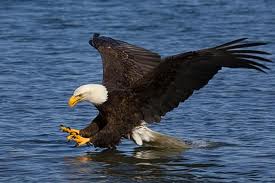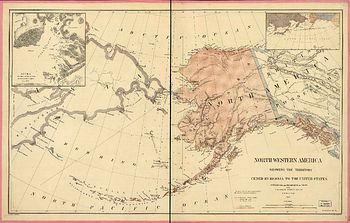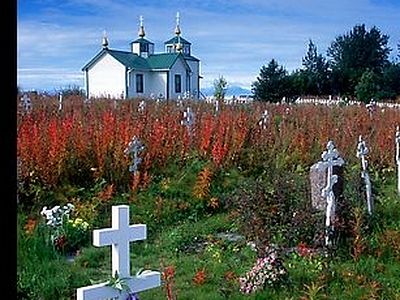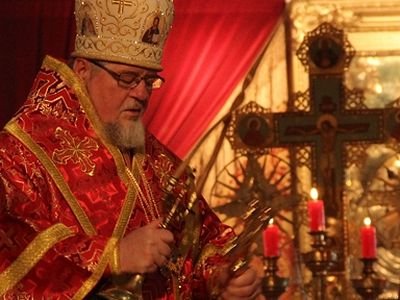August 31, 2010
 The bald eagle, a symbol of Alaska.
The bald eagle, a symbol of Alaska.
"I am writing only to clarify what has been happening in Alaska as we attempt to discern God's Will and nominate a new bishop for this diocese.
Many Alaska Native cultures, until quite recently, practiced match-making and arranged marriages, relationships initiated or promoted by the parents of a prospective bride or groom. Usually, the proposal was then accepted or rejected by one of the pair, but obviously, one could consider only a single option at a time. No one ever had to choose between several simultaneous suitors.
In the same way, selecting a bishop can be compared to an arranged marriage in which, in our case, the Holy Synod has vetted a man to become our bishop, and the clergy and laity of the diocese, as the bride, has the option to accept or reject him. That is the process in which we are intensely engaged now.
Abbot Gerasim (Eliel) was invited to celebrate Christmas and Theophany in Southeast Alaska, among the predominantly Tlingit parishes of Sitka, Juneau and Hoonah. They welcomed him and seem to have been favorably impressed by him.
This summer, Abbot Gerasim went to an Alutiiq regional summer camp, organized by the Chugachmiut Native Corporation at the ancient village site of Nuchek, in Prince William Sound, and then spent a week in the most isolated of all our villages, Nikolai, an Athabaskan Indian parish near the source of the Kuskokwim, Alaska's second-longest river. He witnessed and engaged in subsistence fishing activities, held daily services, baptized six infants and children and continued downriver by boat to the next village, Stoney River. From there, because of the unexpected death of a villager, we were detoured up the Stoney River itself, to one of our smallest parishes, Lime Village. I doubt that any bishop or candidate for bishop ever visited this community of fifteen houses and a log church. The town is too small to sustain either a public health clinic or a school. While it had been intent to accompany him all the way down the river, I had to return to Anchorage for a wedding and therefore left Abbot Gerasim in this isolated village, basically saying "Hasta la Vista, Brother," and flying off. I cannot imagine simply abandoning any past bishop I have ever known with the hope that I'd find him four days and four hundred miles later, but that is what happened.
And four days later, Father Gerasim had found his way down river, "hitch hiking" from Lime to Stoney to Sleetmute to Crooked Creek to Chuathbaluk to Aniak, to Lower Kalskag, all totally unfamiliar "bush" Alaska, and arrived on schedule at Kwethluk. This was a test of patience and even courage we had not engineered or foreseen, but he passed it with ease and grace.
By the end of July, Abbot Gerasim had visited all the parishes on the Kuskokwim and met all the local clergy. He attended the deanery conference in Kasigluk and visited Nunapitchuk, celebrated his 49th birthday in both Lime Village and Chuathbaluk, and, it seemed, had a great time doing so. He was in Kodiak for the St. Herman Day festivities and return to the Kenai Peninsula, where he visited Kenai and Ninilchik on the drive southward and visited Nanwalek and Port Graham on the way back north. Then he'll go to both the Yukon and Nushagak River regional clergy-laity summer conferences, concluding his tour of Yup'ik Alaska.
This winter, he will spend Christmas in the Aleutian and Pribilof Islands and begin Theophany at Lake Clark, performing the Great Blessing of Water along the entire river system threatened by the opening of one of the world's largest open pit mines. Together with His Grace, Bishop Benjamin, he will invoke God's blessing on the waterways at Nondalton, Newhalen, Igiugig, Levelock, Naknek, Pilot Point, Perryville and Chignik, meeting the people and spending time in the homes of every priest and his family. By the end of January 2011, Alaska will know Abbot Gerasim and Abbot Gerasim will know Alaska.
Then it will be our opportunity to nominate him to become our bishop or not. We will hold a special Diocesan Assembly to discuss whether or not we are prepared to nominate him. If the delegates decline to do so, we will find another candidate and begin another round of visitations, allowing everyone to meet and know the man, and giving him the chance to become acquainted with us.
There is no rush. We are not in any hurry. No one is being "imposed" on Alaska. Like an arranged marriage, the bride is free to reject any suitor and the "parents" cannot insist that she accept any particular "candidate." We have not adopted a "democratic" election process in which several candidates compete simultaneously because our diocese is too large and transportation is incredibly expensive.
As for the report that Bishop Benjamin vetoed the suggestion from some Native clergy to consider another candidate at this time, I think this was, therefore, somewhat misleading. His Grace only asked that the clergy consider one potential candidate at a time and not complicate the process by introducing "rival suitors." Trying to get acquainted with and then chose between two or more, would, His Grace and I believe make the process more confusing as well as expensive. The possibility remains that the first, second and even third candidates may not gain the confidence or support of the clergy and laity. This only means that His Grace Bishop Benjamin would probably continue as our locum tenens for another year or two. And I think we are content with that possibility. Bishop Benjamin served here for four years, two as dean of the Cathedral and two as dean in Kodiak, and he knows and loves us. We trust him. So there is no immediate need to hurry. God will reveal His Will to us in His Time.
I hope this clarifies the rather unique process by which we hope to discern God's Will for us and the future of our amazing and unique diocese.
with love and humble blessings
the unworthy archpriest
Michael Oleksa
Acting Chancellor
Diocese of Sitka, Anchorage and Alaska"
Orthodox News




